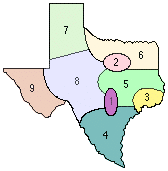UIL Speech Judges
If you have corrections, questions or comments regarding this information, please notify The UIL Speech and Debate department at speech@uiltexas.org or 512-471-5883.
Ken Patton
Current high school:
None
Currently coaching?: No
Conference:
Number of years coached:
Number of tournaments judged: 16
High school attended:
Houston Milby
Graduated high school: 1978
Participated in high school: Yes
Participated in college: Yes
Judging qualifications:
I competed in Extemp and CX in High school managing to place in several tournaments and even to win some. Highest level achieved was Regional finalist. I obtained an NFL Double Ruby before graduation.
I was very active officiating forensic events in the Houston area during and after college until moving in 1991. The foremost skills I bring in judging speech contests is that I am a skilled listener and assessor of what I hear.
Since becoming self-employed, I find I now have the time and flexibility to give back to this scholastic competition.
I reside in Austin, Texas.
Judging Philosophy
CX
Judging approach: Tabula Rasa
Policy priority: Communication skills and resolution of substantive issues are of equal importance
Evidence philosophy: Quantity of evidence and quality of evidence are of equal importance
Paradigm: My philosophy is to assess how CX competitors apply their oratory skills with logic and reason to the topic resolution and the arguments being made in the contest. They are judged on how effectively they utilize those skills to answer the rubrics, including significance to the issue, availability/unavailability of a solution within the status quo and whether or not an effective plan could be implemented. Evaluating the critical thinking applied by contestants to logically arrange their arguments is equal to appraising their skills in verbalizing those arguments effectively. Competitors who utilize the cross-examination process to bolster their presentations also tend to rate higher in the contest.
LD
Approach: Communication skills and resolution of substantive issues are of equal importance
Philosophy:
In judging LD debate, the more effectively a communicator brings their position on the resolution in a clear and concise manner will usually have higher ratings and more success. It is inherent in the LD format where the contestant needs to persuade the listener that their position is the superior solution rather than convincing them through a preponderance of evidence. But even eloquent speakers will be bolstered by corroborative authentication. Their words cannot be without substance. Theoretically, at it’s inception, the LD debates were held to convince legislators that one person’s solution to the issues (primarily slavery) were superior to their opponents and made them more qualified to serve in the U.S. Senate. Shouldn't that still be the goal of the LD debater?
Contact Information
email: kpatton85@austin.rr.com
cell: 512 6804086
office:
Availability Information
Meet types:
Invitational
District
Regional
CX State
State Meet
Congress Region
Congress State
Qualified for:
CX
LD
Extemp
Congress
Travel
Region of residence:
1
I will travel to: 1 3 4 5







